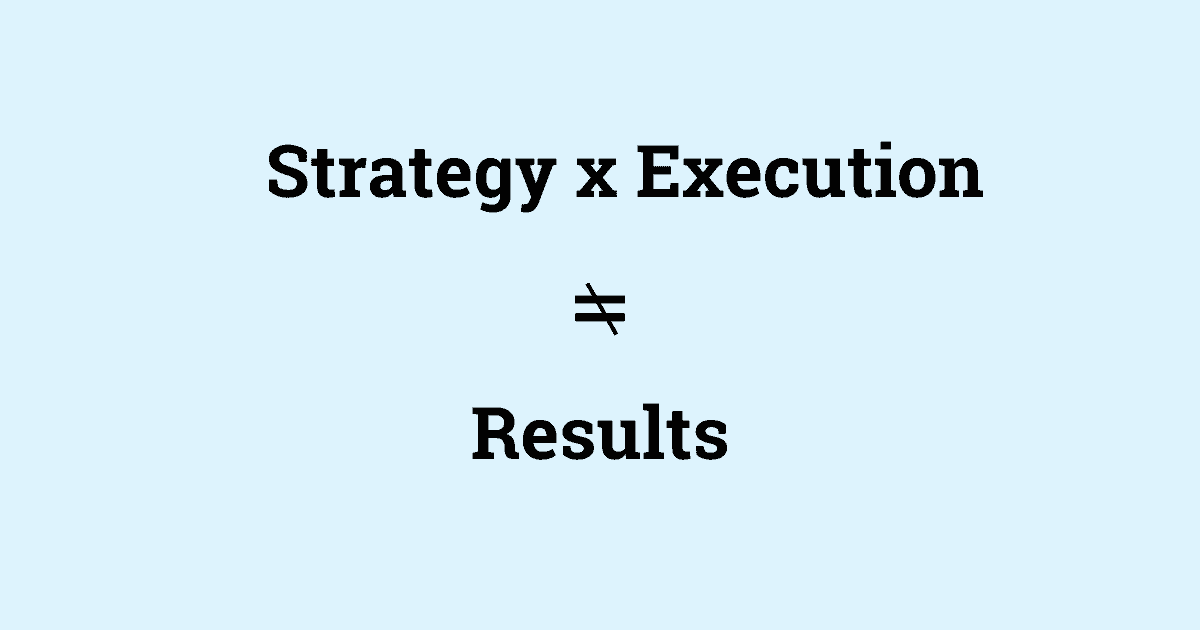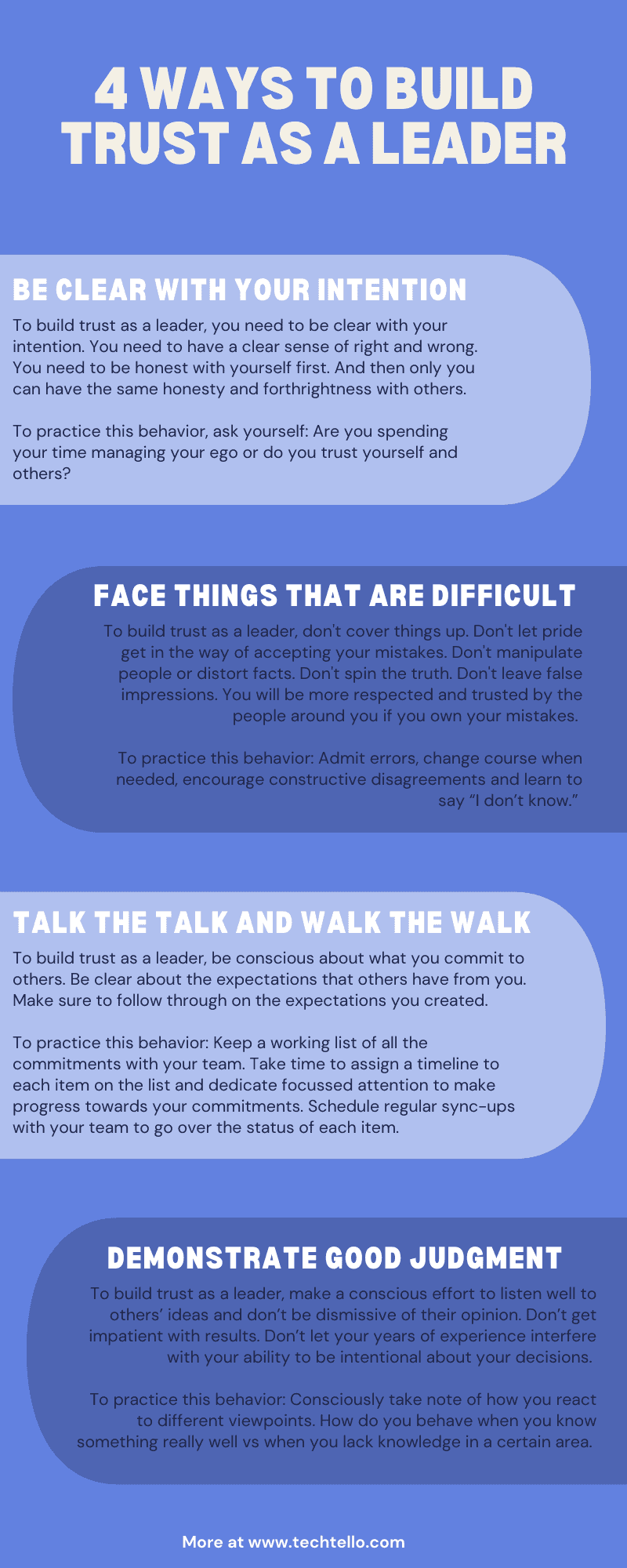Leading With Trust: 4 Effective Ways to Build Trust as a Leader

We have all had relationships that are built on trust and those that are not. If you look back to those experiences, you can clearly say that there’s a significant difference between them. Not only in the quality of your experiences, but also the outcomes you achieved.
You may trust yourself, the confidence you have in your skills and abilities to set and achieve goals, to lead teams, and to drive organizational growth as a leader. But inspiring and earning the same level of trust from others is a very different skill.
Let’s start with understanding trust and why it’s important for effective leadership.
When you meet someone for the first time, they automatically mark you in the friend or foe category. What you say and how you behave are important criterias into this decision, but the most important factor is how you make them feel. Do they feel safe around you? Have you given them reasons to doubt you? Is there anything you have said or done that might make you look like an opponent?
Trust simply starts with intention. When people trust you, they trust your intention to do the right thing. When you are wrong, they trust you to find the right answer. When you make a mistake, they trust you to fix the problem. When you don’t know the path to take, they trust you to seek the information necessary to make a decision.
Overtime, trust automatically extends from “trusting your intention” to “trusting your cause.” People who trust you become committed to your cause and are ready to go the extra mile for it. They believe in you and want to be a part of your story. They link their success to your success and that inspires them to overcome the challenges and persevere in the face of struggles.
However, when others don’t trust you, they are suspicious of everything you say or do. The agenda you determine, the direction you decide, the advice you provide, the information you share, everything is met with resistance and judgment. Without trust, doubt seeps in and forms the basis of every interaction. It impacts how information is exchanged, how decisions are made, how ideas are executed and most importantly it places a limit on the outcomes you achieve together.
“Trust always affects two outcomes–speed and cost. When trust goes down, speed will also go down and costs will go up. When trust goes up, speed will also go up and costs will go down. The traditional business formula says that strategy times execution equals results: But there is a hidden variable to this formula. Trust–either the low trust tax, which discounts the output, or the high-trust dividend which multiplies it,” writes Stephen M. R. Covey in The Speed of Trust.
From strategy to execution to results, no leader can be effective without the foundations of trust. Trust is the single most critical driver of every leader’s effectiveness and the hidden element in the formula of every business’s success.
What can you do to build trust as a leader?
Resolving conflicts, giving timely feedback to your team, communicating priorities and goals, staying transparent, recognizing and appreciating good work, and engaging with the team are all useful behaviors. They are important for establishing your effectiveness as a leader and achieving goals for your organization.
However, these behaviors aren’t the major contributing factor in building high levels of trust with your team. They are necessary to lay the foundation, but not strong enough to build a fort. They can earn you appreciation and respect, but not the trust you need to push critical changes forward.
Trust can only be earned and evolved by consistently practicing these 4 positive behaviors over long periods of time.
4 effective ways to build trust as a leader
1. Be clear with your intention
Leaders who don’t feel safe themselves cannot pass on the feeling of safety to their teams. Concerned with their own survival, they become too self-interested in protecting their own goals and advancing their own agendas. They put up walls to seek information that bolsters their ego and avoid anything that might hurt it. They stop watching out for their people and start watching out for themselves.
Their behavior and actions aren’t rooted in advancing others, as they are more concerned with advancing themselves. In effect, they stop trusting others.
“The moment a leader allows himself to become the primary reality people worry about, rather than reality being the primary reality, you have a recipe for mediocrity, or worse. This is one of the key reasons why less charismatic leaders often produce better long-term results than their more charismatic counterparts,” writes Jim Collins in Good to Great.
To build trust as a leader, you need to be clear with your intention. You need to have a clear sense of right and wrong. You need to be honest with yourself first. And then only you can have the same honesty and forthrightness with others. Trust isn’t a one-way street. Only when you can trust others first, can they trust you back. Because trust comes with giving it away to people first. People can’t trust you unless they know you trust them first.
To practice this behavior, ask yourself: Are you spending your time managing your ego or do you trust yourself and others?
2. Face things that are difficult to face
Any leader who is doing any worthwhile work is bound to make mistakes – their strategy may fail, products they invested in may not generate any value, they can make a wrong hiring call, or may decide against a potentially great idea.
It’s impossible to not make these mistakes. What’s possible is to acknowledge that you screwed up, learn from these mistakes and set an example for everyone that it’s okay to be wrong sometimes. What’s not acceptable is to lie or try to cover it up by passing blame or pushing someone else under the bus.
Many leaders fear that taking responsibility for mistakes would signal that mistakes don’t matter or that you have lower expectations. That’s not how others see it. Accepting mistakes and acknowledging failures only conveys that:
- You believe that mistakes are a natural part of growth.
- You encourage others to learn from their mistakes.
- You value doing the right thing over being right.
- You value fairness in how people are treated by not blaming others for your mistakes.
- And most importantly, you are someone who would be curious about their mistakes by considering it as an opportunity to problem-solve instead of adopting an attitude of judgment.
To build trust as a leader, don’t cover things up. Don’t let pride get in the way of accepting your mistakes. Don’t manipulate people or distort facts. Don’t spin the truth. Don’t leave false impressions. You will be more respected and trusted by the people around you if you own your mistakes.
As Robert Iger writes in The Ride of a Lifetime “Operate always with integrity and honesty in the world, even when that means facing things that are difficult to face. Be genuine. Be honest. Don’t fake anything. Truth and authenticity breed respect and trust.”
To practice this behavior: Admit errors, change course when needed, encourage constructive disagreements and learn to say “I don’t know.”
3. Talk the talk and walk the walk
We judge ourselves by our intentions and others by their behavior. That’s why following through on our commitments is such a critical component of trust. Inconsistent and unpredictable behavior leads to distrust.
As a leader, if you promise to have monthly one-on-ones with your team, always schedule them on your calendar and make time for them. If you commit to prioritize technical excellence in a quarter over product features, make sure to align all the stakeholders with the direction. If you promise to provide more transparency and clarity around work, take time to share the right level of information with your team and take their feedback to make it better. If you agree to delegate more, consciously prioritize what you plan to do yourself and what activities are best left to others.
Nothing breaks trust more than not following through on your commitments; not doing the things you say you are going to do. When you say one thing and do another thing or make promises but do not keep up with those promises, people start doubting your intention. As we discussed earlier, trust starts with intention. Others can’t trust you if they doubt your intention.
To build trust as a leader, be conscious about what you commit to others. Be clear about the expectations that others have from you. Make sure to follow through on the expectations you created.
To practice this behavior: Keep a working list of all the commitments with your team. Take time to assign a timeline to each item on the list and dedicate focussed attention to make progress towards your commitments. Schedule regular sync-ups with your team to go over the status of each item.
4. Demonstrate good judgment
Leaders build trust by not letting their confidence turn into overconfidence and become a liability for their people and their organization. They practice confident humility. Confident humility is the confidence in a leader’s ability to make the right decision while acknowledging that they need others to do it right. It’s knowing what they don’t know and having trust in what they do. It’s having faith in their strengths, while also being aware of their weaknesses. It’s accepting that they don’t have the required knowledge, but enough confidence in their ability to acquire that knowledge.
Adam Grant describes confident humility in Think Again as “having faith in our capability while appreciating that we may not have the right solution or even be addressing the right problem. That gives us enough doubt to reexamine our old knowledge and enough confidence to pursue new insights.”
Leaders are required to make tough decisions in high stake situations all the time. And the decision is not always black and white. What builds trust in those crucial moments is not the decision or the outcome itself, but the process by which those decisions are made. People want to be heard. They want to know that their opinion matters. They want to feel safe to disagree. They want to know that you care about what they have to say even if it doesn’t match your conclusion.
To build trust as a leader, make a conscious effort to listen well to others’ ideas and don’t be dismissive of their opinion. Don’t get impatient with results. Don’t let your years of experience interfere with your ability to be intentional about your decisions.
As Robert Iger writes in The Ride of a Lifetime “The first rule is not to fake anything. You have to be humble, and you can’t pretend to be someone you’re not or to know something you don’t. You’re also in a position of leadership, though, so you can’t let humility prevent you from leading. It’s a fine line, and something I preach today. You have to ask the questions you need to ask, admit without apology what you don’t understand, and do the work to learn what you need to learn as quickly as you can. There’s nothing less confidence-inspiring than a person faking a knowledge they don’t possess. True authority and true leadership come from knowing who you are and not pretending to be anything else.”
To practice this behavior: Consciously take note of how you react to different viewpoints. How do you behave when you know something really well vs when you lack knowledge in a certain area.
Summary
- Trust is the foundation for leadership effectiveness. A leader who doesn’t lead with trust fails to create an amazing success story for their people and their organization.
- Building trust is a long process that requires committing to practicing useful behaviors over long periods of time.
- Trust starts with knowing your intention and slowly aligns with your cause. You cannot expect others to be a part of your journey if they cannot trust you with your intention first.
- Have a clear sense of right and wrong and be honest with yourself. With the right value system guiding your actions, you will inspire others to trust you.
- Don’t cover up your mistakes or avoid things that are difficult to face. Practice truth-telling even if it makes you uncomfortable at first. People will respect and trust your openness.
- Be conscious about your commitments and follow through on them. Nothing breaks trust more than making false promises or saying nice things to motivate people.
- Don’t let your experience or your position interfere with your ability to make better decisions. Make people feel safe to voice opinions and genuinely listen to their viewpoint.

































